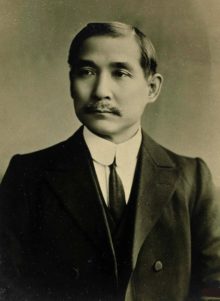With no roots attached, the destiny of a “Floating City” is always subject to externalities and uncertainties. As unsettled as it seems, it does provide a safe ground for the lost souls to search for their identities, and for an array of unexpected opportunities to happen, given its high adaptability to changes. Hong Kong, floating between different political ideologies from colonialism, communism, nationalism to imperialism in the first half of the 20th century, created its own survival dynamics to cope with the unforeseeable future.
The colonial Hong Kong stood in stark contrast to the nationalistic China during the Boxer Uprising in the 1900s. The Qing dynasty declared war on the eight foreign powers, and any facet of Western influences was aggressively opposed by rampaging mobs of Chinese nationalists. Outrage on streets, fires on embassies, and attacks against foreigners and missionaries… the insurrection was so tense and brutal that many of them had to flee to the safe haven – Hong Kong, to prolong their life for the better.

But this surge of nationalism was considered as a sign of weakness in the eyes of Sun Yat-Sen – the Father of Modern China. Together with other social elites who received Western education like Yeung Kui-wan and Tse Tsan-Tai, Sun Yat-Sen felt a strong urge to reform China due to the failing Qing in confronting foreign suppression and its zero tolerance for western ideologies. The colonized landscape of Hong Kong was seen as the safest and easiest ground to discuss political reforms and to plot rebellions, which led to the success of the 1911 Revolution. Only because of being politically different from the late imperial China, Hong Kong could only become a think-tank, breeding pioneering political thoughts that formed a vision for China’s modernization.
The “Sanmin Zhuyi” aka “Three Great Principles” initiated by Sun Yat-Sen was one cutting-edge ideology to establish democracy in China. From “Minzu Zhuyi (民族主義)” (nationalism), “Minquan (民權)” (democracy) to “Minsheng (民生)” (people’s livelihood), the three ideas orbit around the core of people or “Min (民)”, advocating for values like Chinese self-determination, popular rights and even distribution of wealth. Despite the eventual failure to reform China with the 1911 Revolution, this ideology bred by Sun Yat-Sen in Hong Kong laid a solid foundation for his political party – the Nationalist Party or the “Kuomintang (KMT)”, to further shape the political landscape of China and Taiwan.

https://upload.wikimedia.org/wikipedia/commons/2/22/Sun_Yat_Sen_portrait_2.jpg
The rising tide of Communism in China in the 1920s pushed the Nationalists to the verge of collapse. There was little hope of reconciliation especially after the death of Sun Yat-Sen, whose party was later succeeded by General Chiang Kai-Shek – a leader that held no tolerance for Communists. Civil war then broke out to see which party could ultimately be able to take control of the nation. Meanwhile, thousands of lost souls flocked to the colonial Hong Kong, to seek a safe shelter from political madness at the time.
But the colony only provided a short period of protection against surrounding odds for the immigrants. The wave of Japanese Imperialism swept across East-Asian continent, taking over Manchuria, Korea and Taiwan, during the second world war. Hong Kong, unsurprisingly, fell into the hands of the Imperial Japanese and entered the darkest period of all time.

https://i2.wp.com/industrialhistoryhk.org/wp-content/uploads/2013/12/Hand-cart-during-Japanese-occupation.jpg?ssl=1
Fears, insecurities, and vulnerabilities engulfed the territory. Yet, the people survived through the oppressive circumstances with a dim of hope, like how they first migrated to the “Floating City”, adjusting themselves to changes with no guarantees. The grit, flexibility, and resilience of the people have formed the spirit of the city which is passed along to the next generations born native to this land.
#discoverhongkong #explorehongkong #hkhistory #hongkonghistory #hongkongstory #sunyatsen #floatingcity #WWII #1900s


